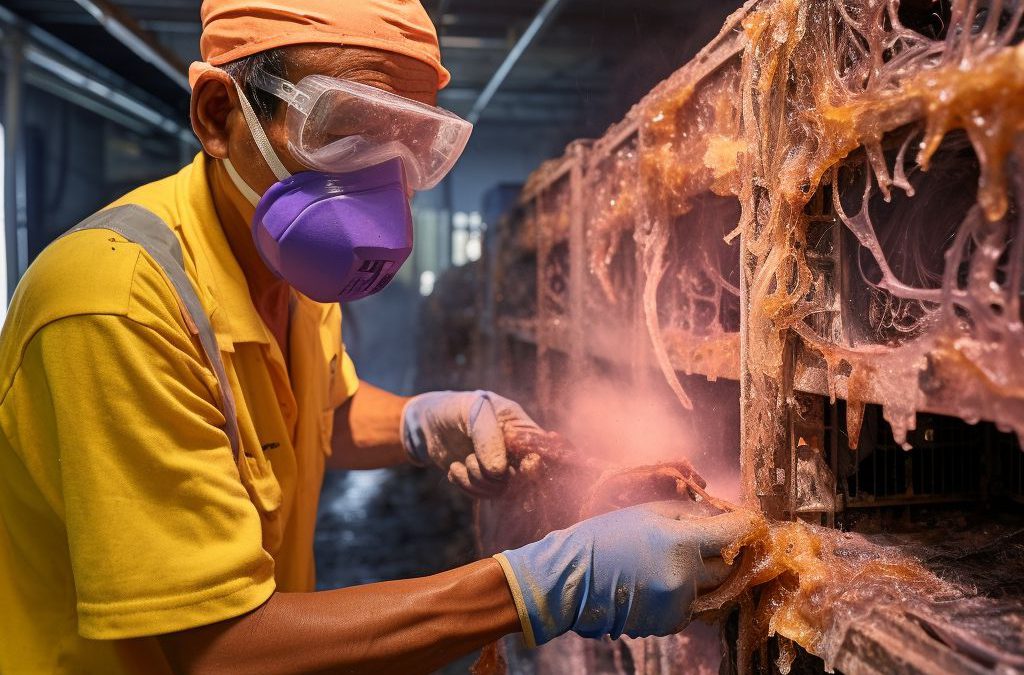Summer is a season that we all look forward to each year with hopes of lots of sunshine and warmth. But with summer also comes the need to keep ourselves cool, and an air conditioner is often the go-to solution. However, what happens when your air conditioner suddenly stops working? The most probable reason is that it’s frozen and needs to be defrosted. Knowing how to defrost your air conditioner is crucial if you want to keep it running effectively. Thankfully, in this article, we’ll take you through a simple step-by-step guide that shows you precisely how to defrost your air conditioner and keep it working seamlessly throughout the summer months.
Tabe of Contents
- 1. Understanding the Reasons Why Air Conditioners Freezes Up
- 2. Preparing the Tools and Equipment Needed to Defrost Air Conditioners
- 3. Step-by-Step Guide on How to Safely Defrost an Air Conditioner
- 4. Techniques on How to Prevent Air Conditioners from Freezing Up
- 5. Maintenance Tips to Ensure an Efficient and Optimal Performance of Air Conditioners
- People Also Ask
- Conclusion
1. Understanding the Reasons Why Air Conditioners Freezes Up
If your air conditioner is freezing up, it is not functioning properly and may lead to further damages if not addressed immediately. Understanding why air conditioners freeze up is the first step to prevent this issue from happening again. Below are some of the reasons why air conditioners freeze up:
1. Poor Airflow: When there is not enough airflow, the evaporator coil will get too cold and may freeze up. This can be caused by a dirty air filter or a blocked air duct. It is important to regularly clean and replace the air filter and make sure there are no obstructions in the air duct to ensure proper airflow.
2. Low Refrigerant: The refrigerant is what cools the air in your air conditioner. If there is a leak or low refrigerant levels, it can cause the evaporator coil to freeze up. It is important to have a professional technician check and refill the refrigerant if needed.
3. Thermostat Issues: If the thermostat is not functioning properly or set too low, it can cause the evaporator coil to freeze up. Make sure to set the thermostat to the appropriate temperature and have it checked by a professional if it is not functioning properly.
Overall, understanding the reasons why air conditioners freeze up is important in preventing this issue from happening again. Regular maintenance and check-ups can also help identify and address any potential problems before they become bigger issues.
2. Preparing the Tools and Equipment Needed to Defrost Air Conditioners
Before you start defrosting your air conditioner, it’s important to gather all the necessary tools and equipment that you’ll need to get the job done properly. Here are a few key items you’ll need to have on hand:
Tools:
- Screwdriver: You’ll need this to dismantle the air conditioner to access the coils and other internal components.
- Towel or rag: This will be used to soak up any excess water that spills during the defrosting process.
- Plastic scraper: To help gently remove any ice that has built up on the coils.
Equipment:
- Bucket: You’ll need a bucket or large container to catch any excess water or coolant that may drip down from the AC unit as it defrosts.
- Hair dryer or heat gun: This will be used to gently melt any ice or frost that has accumulated on the coils. Be sure to use a low heat setting and keep the hair dryer or heat gun at a safe distance from the AC unit to prevent any damage.
Having these tools and equipment on hand before you start defrosting your air conditioner will help make the process easier and more efficient. Additionally, it’s important to ensure that the power supply to the air conditioner is turned off to avoid any potential accidents or electrocution. Now that you have your tools and equipment ready, it’s time to start defrosting your air conditioner!
3. Step-by-Step Guide on How to Safely Defrost an Air Conditioner
Defrosting your air conditioner is an important process to keep it running efficiently. A frozen air conditioner will not only consume more energy, but it may also damage the compressor. Here is the step-by-step guide on how to safely defrost your air conditioner:
Step 1: Turn Off the Air Conditioner
The first thing you should do is turn off the air conditioner. It is important to let the unit defrost naturally. You should not try to force the defrosting process by using any sharp objects. This can damage the coils.
Step 2: Remove the Filter
Once the air conditioner has completely defrosted, you should remove the filter. The filter can become clogged with ice, and this can hinder the performance of the air conditioner. Clean the filter with water and let it dry completely before putting it back in place.
Step 3: Inspect the Coils
After removing the filter, inspect the coils. Check for any visible signs of damage and clean any dirt or debris that may have accumulated on the coils.
Step 4: Turn On the Fan
Once everything is cleaned and dry, you can turn on the fan. This will help to circulate the dry air and speed up the defrosting process.
Step 5: Turn On the Air Conditioner
After a few hours, when everything is completely dry, you can turn on the air conditioner. Make sure that the unit is running properly and that the air is flowing freely.
By following these simple steps, you can safely defrost your air conditioner. Remember, it is important to defrost your air conditioner regularly to keep it running efficiently and to prevent any damage to the compressor.
4. Techniques on How to Prevent Air Conditioners from Freezing Up
Preventing air conditioners from freezing up is essential to ensure optimal performance and prolong the lifespan of the unit. Here are some techniques to prevent air conditioners from freezing up:
- Proper airflow: Airflow is crucial in keeping the temperature balanced and preventing the formation of ice. Make sure that the air filter is clean and not clogged with debris, as a dirty filter can impede airflow. Additionally, check that the vents are not blocked by furniture or curtains. Lastly, ensure that the condenser unit outside is free from debris and vegetation, allowing proper airflow to the unit.
- Maintenance: Regular maintenance of the air conditioner can prevent freezing up. Schedule a yearly maintenance with a professional HVAC technician to clean the coils, check the refrigerant level, and ensure that the system functions correctly.
- Temperature control: Keep the temperature of the room at a consistent level. Turning the thermostat up and down frequently can add stress to the system, leading to freezing up of the unit. Additionally, try to avoid setting the thermostat at its lowest setting, as it can cause the evaporator coil to freeze.
- Proper installation: Ensure that the air conditioner is installed correctly. Improper installation can lead to inadequate airflow or incorrect refrigerant levels, causing freezing up of the unit. Always consult with a licensed technician for air conditioner installation.
- Reduce humidity: A high humidity level can cause ice to form on the evaporator coils. Using a dehumidifier or keeping the windows closed when running the air conditioner can help reduce humidity levels in the room.
By following these techniques, homeowners can prevent air conditioners from freezing up and ensure an efficient performance of their unit. Proper maintenance, temperature control, and installation can help avoid costly repairs and extend the lifespan of the air conditioner.
5. Maintenance Tips to Ensure an Efficient and Optimal Performance of Air Conditioners
Ensuring your air conditioner runs at peak performance comes down to regular maintenance. Proper maintenance can reduce energy waste, reduce the risk of breakdowns, and improve the lifespan of the system. Here are a few tips to follow to keep your air conditioner running efficiently.
1. Clean the Air Filter
One of the easiest ways to ensure your air conditioner is functioning at its best is to clean the air filter regularly. Dirty filters can restrict airflow and cause the system to work harder than necessary, leading to higher energy bills and a shorter lifespan. Most filters need to be cleaned every one to three months, depending on usage.
2. Keep the Condenser Unit Clean
The condenser unit, located outside your home, plays an essential role in the cooling process. Over time, it can accumulate dirt, debris, and leaves, reducing airflow and preventing efficient operation. To keep it clean, use a garden hose to rinse off the unit’s exterior. Be cautious not to bend or damage the delicate fins when cleaning.
3. Check the Coil Fins
The aluminum fins on the evaporator and condenser coils are essential for efficient airflow. Over time, they can bend or collect debris, reducing airflow and performance. Use a fin comb to straighten out any bent fins.
4. Schedule Professional Maintenance
While there are maintenance tasks homeowners can do themselves, scheduling a professional maintenance check once a year is crucial. An experienced technician will inspect the unit, clean it thoroughly, and spot any potential issues that could lead to larger problems in the future.
5. Check the Thermostat
Make sure to check the thermostat settings and batteries to ensure proper function. An incorrectly calibrated thermostat could cause your air conditioner to run longer than necessary, increasing energy bills.
By following these maintenance tips, you can keep your air conditioner running efficiently and reduce the risk of unexpected breakdowns. Remember, regular maintenance is the key to getting the most out of your system, so make sure to keep up with it.
People Also Ask
1. How do I know if my air conditioner is frozen?
If your air conditioner is blowing warm air, has reduced airflow, or drips water or ice, it may be frozen.
2. How long does it take for an air conditioner to defrost?
The defrosting process can take anywhere from 30 minutes to several hours, depending on the severity of the frost buildup.
3. Can you defrost an air conditioner by turning it off?
Yes, turning off your air conditioner will allow it to defrost naturally. However, this process may take longer than using the defrost function.
4. How do you manually defrost an air conditioner?
Manually defrosting your air conditioner involves turning off the unit and using warm water or a hairdryer to melt the ice buildup.
5. What causes an air conditioner to freeze up?
Low airflow, refrigerant leaks, and dirty air filters are common causes of air conditioner freeze-ups.
Conclusion
Defrosting your air conditioner is an essential maintenance task that can help improve the unit’s efficiency and prevent damage. Whether you use the defrost function or manually defrost the unit, it is important to address frost buildup promptly to avoid costly repairs and replacements. Keep in mind that regular maintenance and cleaning can also help prevent freeze-ups and other common air conditioner issues.

Senior HVAC Technician
With over 15 years in the HVAC industry, Lucas specializes in diagnosing intricate AC system issues. His commitment to precision and thoroughness ensures every repair restores optimal functionality to your cooling systems.

